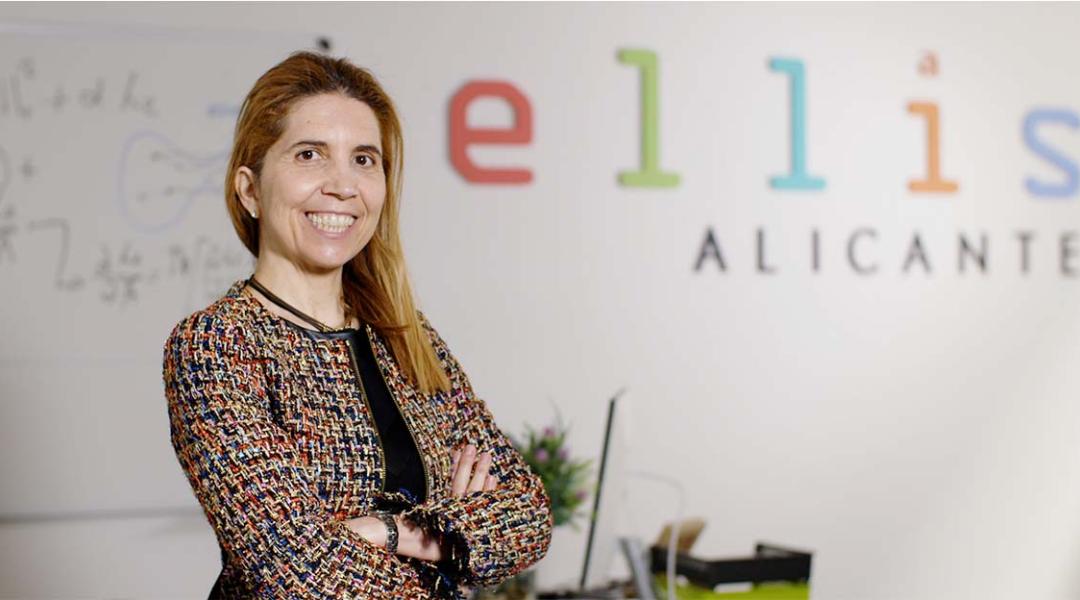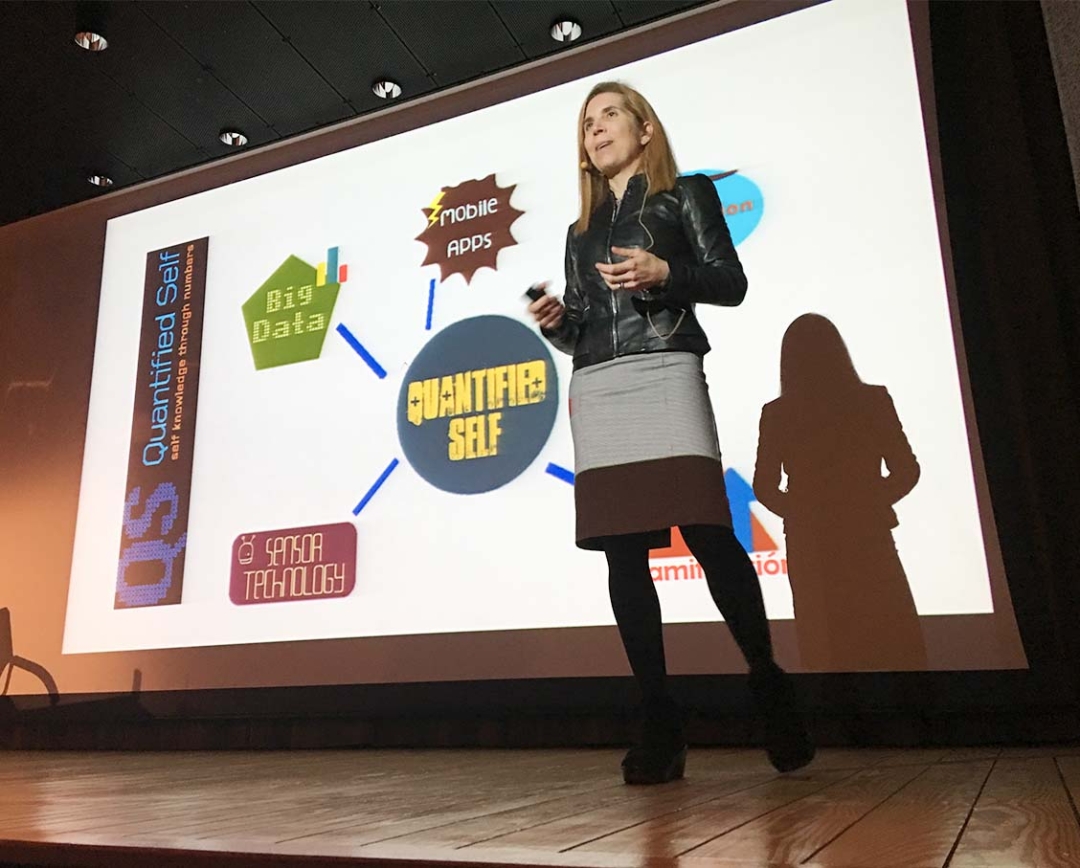Nuria Oliver
Intelligence for all

Although for most mortals artificial intelligence (AI) is still a concept that belongs more to science fiction, the truth is that it is present in our everyday lives in a massive and decisive way. Bringing it closer to the general public is one of Nuria Oliver’s challenges, for whom science will be key to our survival as a species, as well as providing the social sphere with huge opportunities.
Nuria Oliver (Alicante, 1970) has spent all her life being an ally of intelligence, both human and artificial. Proof of this are the dozens of titles, awards, and management roles on her CV: Telecommunications engineer, Ph.D. in AI from MIT (Massachusetts Institute of Technology), vice-president and co-founder of Ellis Europa (a non-profit foundation dedicated to researching AI for the greater good), 2019 Data Scientist by Big Data Value Association, Rey Jaume I Award in 2021 New Technologies… Beyond these acknowledgements, what this scientist cares about the most is to continue paving the way for AI to make the most of its “tremendous transformational power”.
How would you explain AI to the uninitiated?
Very briefly, I’d say that it’s a discipline within IT or engineering that develops smart computer systems based on human intelligence. Modern AI, present in our day-to-day lives through endless uses (smartphones, personal assistants, medical diagnosis support systems, Internet browsers, geolocation, etc.), is based on learning through data and experience. But whereas a human only needs a few references to know what a cat is, for instance, an AI system needs millions. What’s really important is that, thanks to its transversality, scalability, and capacity to explain the past and make future predictions, AI has a tremendous power to transform our economy and society.
The application of AI for the greater good is at the heart of your work, what does this mean exactly?
There are many fields in which AI contributes significantly to social prosperity: public health, climate change, migrations, economic growth, smart cities, education, etc. The main issue is having access to quality data. Once we have them, we can use AI techniques to interpret the data and use them to make evidence-based decisions, which is the crux of the matter.
“We need AI to survive as a species because it’s vital to face some of humanity’s biggest challenges”
Is your project predicting the pandemic, winner of the PRIZE Pandemic Response Challenge, an example of that greater good? How has AI helped in this field?
Absolutely, since it’s about public health. In this context, AI has been essential. Firstly, by helping to accelerate the discovery of effective drugs and treatments. Secondly, by supporting clinical decision-making thanks to Covid-19 diagnosis models based on, for example, predictive models on the likelihood of needing a ventilator according to symptoms. Regarding the project itself, our team, called ValenciaIA4COVID, developed a deep neural network model that hugely contributed to decision-making based on scientific knowledge.
You’re a successful woman within the field of science, something less common than it should be. How can STEM —acronym for science, technology, engineering, and mathematics— be promoted, especially among women?
The most important thing is to study what we’re passionate about. That said, technology careers are the ones with the most promising future, the most flexible work-life balance, and the most competitive salaries. I’d like to encourage girls to study technology. We can’t afford for women not to be part of the fourth industrial revolution and defining the society of the future.

Nuria Olver is a world expert on AI and Big Data. © Image courtesy of Nuria Oliver
You’re a passionate advocate of Spanish talent, what condition is it in?
Talent is a country’s most valuable asset. People are the ones who have the capacity to contribute positively to our society, who can improve the world. I advocate Spanish talent, especially those who’ve had to leave due to a lack of opportunities. We should strongly invest in programmes to attract, retain, and inspire the next generation of excellent talent in our country.
Is talent born or made?
Talent is fundamentally made. Achieving excellence in any field entails thousands of hours of studying and learning, that is, a lot of perseverance and passion. Obviously, if someone has a natural ability that aligns with their interests, they’ll have a good starting point to achieve excellence, but always through hard work. According to Edison: “None of my inventions came by accident. [...] What it boils down to is one per cent inspiration and ninety-nine per cent perspiration.”
Coming back to AI, how will it improve our lives in the coming years?
The opportunities that AI provides are huge: preventive and predictive medicine, personalised education, efficient energy systems, self-driving transport, precision farming... What’s more, I’m sure that we need AI to survive as a species because it’s vital to face some of humanity’s biggest challenges, such as climate change, humanitarian emergencies, or an ageing population.
“It’s extremely difficult for someone to identify the opportunities that AI provides without knowing what it is”
Despite, as you say, AI being a part of our everyday lives, do you think society understands this technology?
There’s a worrying lack of awareness. For this reason, it’s absolutely essential to get citizens interested in AI. In my particular case, I’ve spent more than a decade suggesting that an overarching computational thinking course be included in mandatory education, as well as reinforcing human skills such as critical thinking, creativity, or emotional intelligence. They’re all vital for our future. Educating citizens and decision makers is a priority because, obviously, it’s extremely difficult for someone to identify the opportunities that AI provides without knowing what it is.
We’ve spoken about the advantages of AI, but which are its potential drawbacks?
We can’t develop AI’s full potential if we don’t address its current limitations. For example: biases and algorithmic discrimination, computational violation of privacy, asymmetrical access to data and knowledge, or manipulation and lack of truthfulness, given that algorithms can be hacked, and AI can create deepfake content that is indistinguishable from real content.
Some predict a future full of Terminator-like robots, do you think technology can get out of hand?
Stephen Hawking said: “Success in creating effective AI could be the biggest event in the history of our civilization. Or the worst.” I’ve spent 25 years of my career trying to make it the best thing that’s happened to us, but we need to guide technological development in favour of humanity. We mustn’t forget that all technological growth entails progress.


